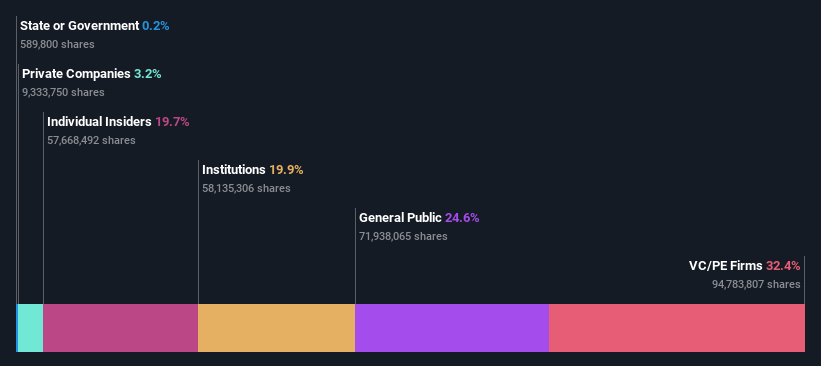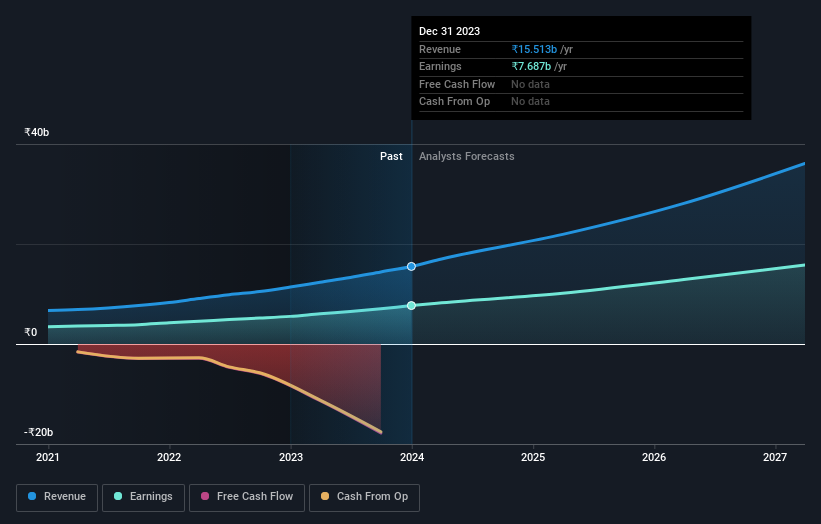Stock Analysis
- India
- /
- Consumer Finance
- /
- NSEI:FIVESTAR
Five-Star Business Finance Limited's (NSE:FIVESTAR) stock price dropped 3.8% last week; private equity firms would not be happy

Key Insights
- The considerable ownership by private equity firms in Five-Star Business Finance indicates that they collectively have a greater say in management and business strategy
- The top 5 shareholders own 51% of the company
- Insider ownership in Five-Star Business Finance is 20%
A look at the shareholders of Five-Star Business Finance Limited (NSE:FIVESTAR) can tell us which group is most powerful. And the group that holds the biggest piece of the pie are private equity firms with 32% ownership. In other words, the group stands to gain the most (or lose the most) from their investment into the company.
As a result, private equity firms as a group endured the highest losses last week after market cap fell by ₹8.5b.
Let's delve deeper into each type of owner of Five-Star Business Finance, beginning with the chart below.
Check out our latest analysis for Five-Star Business Finance

What Does The Institutional Ownership Tell Us About Five-Star Business Finance?
Institutions typically measure themselves against a benchmark when reporting to their own investors, so they often become more enthusiastic about a stock once it's included in a major index. We would expect most companies to have some institutions on the register, especially if they are growing.
Five-Star Business Finance already has institutions on the share registry. Indeed, they own a respectable stake in the company. This implies the analysts working for those institutions have looked at the stock and they like it. But just like anyone else, they could be wrong. When multiple institutions own a stock, there's always a risk that they are in a 'crowded trade'. When such a trade goes wrong, multiple parties may compete to sell stock fast. This risk is higher in a company without a history of growth. You can see Five-Star Business Finance's historic earnings and revenue below, but keep in mind there's always more to the story.

Hedge funds don't have many shares in Five-Star Business Finance. From our data, we infer that the largest shareholder is Lakshmipathy Deenadayalan (who also holds the title of Top Key Executive) with 19% of shares outstanding. Its usually considered a good sign when insiders own a significant number of shares in the company, and in this case, we're glad to see a company insider play the role of a key stakeholder. TPG Asia VII SF Pte. Ltd is the second largest shareholder owning 11% of common stock, and Peak XV Partners Operations LLC holds about 10% of the company stock. In addition, we found that Rangarajan Krishnan, the CEO has 0.8% of the shares allocated to their name.
Our research also brought to light the fact that roughly 51% of the company is controlled by the top 5 shareholders suggesting that these owners wield significant influence on the business.
Researching institutional ownership is a good way to gauge and filter a stock's expected performance. The same can be achieved by studying analyst sentiments. There are a reasonable number of analysts covering the stock, so it might be useful to find out their aggregate view on the future.
Insider Ownership Of Five-Star Business Finance
While the precise definition of an insider can be subjective, almost everyone considers board members to be insiders. Company management run the business, but the CEO will answer to the board, even if he or she is a member of it.
Insider ownership is positive when it signals leadership are thinking like the true owners of the company. However, high insider ownership can also give immense power to a small group within the company. This can be negative in some circumstances.
It seems insiders own a significant proportion of Five-Star Business Finance Limited. Insiders own ₹42b worth of shares in the ₹213b company. That's quite meaningful. Most would say this shows a good degree of alignment with shareholders, especially in a company of this size. You can click here to see if those insiders have been buying or selling.
General Public Ownership
With a 25% ownership, the general public, mostly comprising of individual investors, have some degree of sway over Five-Star Business Finance. This size of ownership, while considerable, may not be enough to change company policy if the decision is not in sync with other large shareholders.
Private Equity Ownership
With a stake of 32%, private equity firms could influence the Five-Star Business Finance board. Sometimes we see private equity stick around for the long term, but generally speaking they have a shorter investment horizon and -- as the name suggests -- don't invest in public companies much. After some time they may look to sell and redeploy capital elsewhere.
Private Company Ownership
We can see that Private Companies own 3.2%, of the shares on issue. Private companies may be related parties. Sometimes insiders have an interest in a public company through a holding in a private company, rather than in their own capacity as an individual. While it's hard to draw any broad stroke conclusions, it is worth noting as an area for further research.
Next Steps:
While it is well worth considering the different groups that own a company, there are other factors that are even more important. Take risks for example - Five-Star Business Finance has 1 warning sign we think you should be aware of.
If you would prefer discover what analysts are predicting in terms of future growth, do not miss this free report on analyst forecasts.
NB: Figures in this article are calculated using data from the last twelve months, which refer to the 12-month period ending on the last date of the month the financial statement is dated. This may not be consistent with full year annual report figures.
Valuation is complex, but we're helping make it simple.
Find out whether Five-Star Business Finance is potentially over or undervalued by checking out our comprehensive analysis, which includes fair value estimates, risks and warnings, dividends, insider transactions and financial health.
View the Free AnalysisHave feedback on this article? Concerned about the content? Get in touch with us directly. Alternatively, email editorial-team (at) simplywallst.com.
This article by Simply Wall St is general in nature. We provide commentary based on historical data and analyst forecasts only using an unbiased methodology and our articles are not intended to be financial advice. It does not constitute a recommendation to buy or sell any stock, and does not take account of your objectives, or your financial situation. We aim to bring you long-term focused analysis driven by fundamental data. Note that our analysis may not factor in the latest price-sensitive company announcements or qualitative material. Simply Wall St has no position in any stocks mentioned.

Simply Wall St
About NSEI:FIVESTAR
Five-Star Business Finance
Five-Star Business Finance Limited operates as a non-banking financial company in India.
High growth potential with proven track record.
